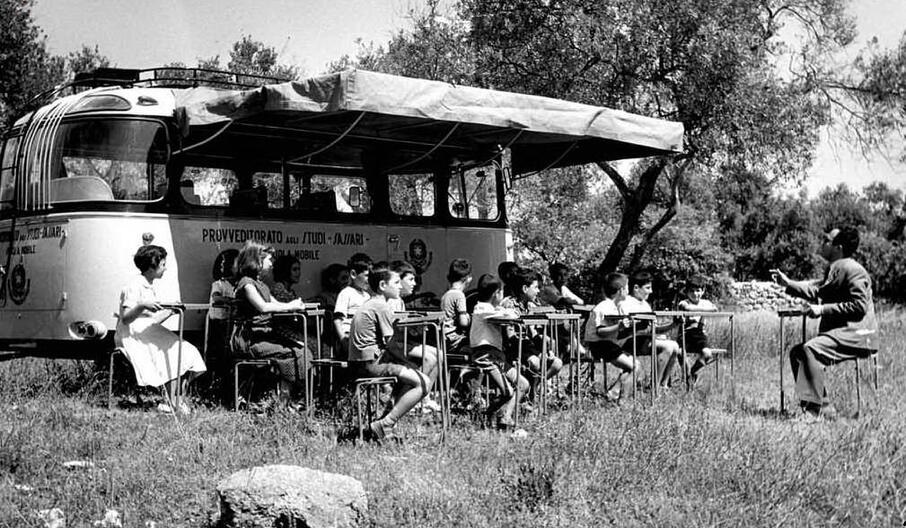Paidobus, The Mobile School 0 Comments

In northern Sardinia, a privileged area for this blog because more accessible by Gabbiano Azzurro Hotel & Suites guests, there was no schooling for children until 1956, children belonging to the traditional agro-pastoral world, who lived in the interior far from population centers and therefore from schools. They were destined to remain illiterate due to the distance and also the lack of roads connecting the various towns and schools.
The idea came to the Superintendent of Sassari, Salvatore Cappai: "If the child doesn’t go to school, the school goes to the child". A far-sighted project that would have allowed those children to access a fundamental right established in 1948 by the Universal Declaration of Human Rights, art. 26: “Everyone has the right to education”.
He therefore had special buses prepared and had "Mobile School" written on the sides. He called them Paidobus, from the Greek pais-paidós, kid. The kids' bus. They had 20 seats, with folding desks on the backs, a revolving blackboard, a projector, a record player with records, radio. A gas stove, because lunch was also served. Outdoor lessons were also planned, so there were twenty folding iron desks and a sunshade, anchored to the side of the bus, to protect the students from the sun. There even was a library with novels and dictionaries.
The Paidobus also introduced a reform of the multi-class school method. Not only were educational results achieved, but also social and welfare ones, because by providing the students with school supplies and providing them with lunch, this financially helped the families too.
Giovanni Gelsomino, a former teacher and animator of the Gallura Almanac, says: "A school of wonders, in an area where the Middle Ages had almost not ended, no carriage roads, no telephones, often not even electricity, and kilometers and kilometers between one stazzo (typical Sardinian house) and the other, people isolated from the rest of the world who didn't know what was happening a short distance from their home."
Think how this opportunity changed the lives of those children. They were not closed in a classroom and grasped school subjects also by "traveling" within them. Where was the sea? The Mediterranean scrub? There they went to see them and smell the scents.
Four buses were used in the project and they certainly changed the lives of students and parents. It also became a means of social integration where the distance between the agricultural stazzi did not allow the same socialization. Those who experienced the Paidobus school era remember a cheerful environment and a playful atmosphere between children of different ages who learned almost like on a school journey but in a thoughtful and effective way.
One of those privileged children, now a university teacher, who attended the 4th and 5th grade on the Paidobus between 1956 and 1958, says: "From one day to the next we were projected into the future, it was an acceleration of the time, in an area where illiteracy and school dropout were very high... I consider myself lucky, I benefited from a favorable astral conjunction, this structure was an extraordinary opportunity.”
The area where the four Paidobus operated would undergo, just a decade later, from depopulated and disadvantaged areas to touristy and elite with the development of the Aga Khan Coast. In fact, ten years later, with the advent of tourism on the coast, Gallura and its inhabitants experienced a huge change never seen before. The inland areas were depopulated in favor of settlements along the coast, and villages and houses arose and became necessary also the construction of schools, thus concluding the wonderful experience of the "Mobile School".
"The purpose of schooling is to replace an empty mind with an open one...” (Malcolm S. Forbes)
--Written by Daniela Toti
Share your opinion with us!